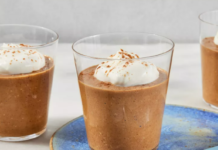Papaya has a reputation for such a trove of health benefits it’s been called the “fruit of long life.”
It’s listed as one of the “longevity superfoods” eaten in the Blue Zones — places around the world where people live extraordinarily long and healthy lives.
Headlines have dubbed it “The #1 Fruit Eaten by the World’s Oldest Living People.”
Pearl Taylor, a 103-year-old woman who lives independently in Dayton, Ohio, and dishes out life advice on TikTok, says she’s been eating papaya every morning for years.
“More people need to learn about papaya,” she told TODAY.com. “Papaya is an excellent fruit.”
What is papaya?
Papaya is a tropical fruit with a vibrant yellow or orange flesh, and black seeds. It’s “aromatic and juicy with a pleasant, sweet flavor,” notes the Florida Department of Agriculture.
It has a buttery, milky texture ideal for smoothies, the American Heart Association adds.
In the U.S., papayas are grown in Hawaii, California, Texas and Florida, but most of the fruit sold in stores is imported from Mexico, according to the Western Institute for Food Safety and Security.
Papaya nutrition
One cup of papaya cut into small pieces contains the following, according to the U.S. Department of Agriculture:
62 calories
15 grams of carbohydrates
2.5 grams of fiber
11 grams of sugar
Papaya has no cholesterol and contains less than 1 gram of fat or protein per serving.
It’s packed with nutrients including magnesium, potassium, folate, lycopene, and vitamins A, C, E and K. It also contains a bit of iron and calcium.
What are the benefits of eating a papaya?
Papaya a “fantastic choice in terms of fruits,” says registered dietitian Maya Feller of Brooklyn-based Maya Feller Nutrition and author of “Eating from Our Roots: 80+ Healthy Home-Cooked Favorites from Cultures Around the World.”
“Papaya is a great source of various phenolic compounds, flavonoids,” Feller tells TODAY.com, referring to the bioactive molecules found in plants that are anti-inflammatory and considered beneficial for human health.
“They have antioxidant activity that is quite great… Antioxidants really help to blunt the effect of free radical damage.”
Free radicals are damaging particles generated when the body performs regular processes needed for life. This damage can lead to inflammation and may increase the risk of cancer and other diseases, the National Cancer Institute notes, but antioxidants can protect cells from it.
Papaya’s hallmark bright yellow or orange color is the result of carotenoids, such as beta carotene, a chemical that helps form Vitamin A, which act as antioxidants, Feller notes.
Another carotenoid in papaya is lycopene, which may reduce the risk of heart disease and stroke, according to the American Heart Association.
Carotenoids can be protective against cancer, too, studies have found. They’re more bioavailable — better able to be absorbed and used by the body — from papaya than from tomatoes and carrots in humans, a study found.
The fruit contains fiber, which supports gut health and can help lower cholesterol.
It’s high in potassium, which can lower blood pressure and can “really have a beneficial impact on cardiovascular health,” Feller adds.
There’s also thought to be some potential for anti-diabetic activity in people who eat papaya because of how the fruit affects glucose and insulin response, she notes.
Is papaya considered a superfood?
Feller says she doesn’t call anything a superfood.
“All pieces of produce have wonderful properties and they really work best in synergy and when consumed across a broad spectrum, meaning there’s a lot of variety of plants in the person’s pattern of eating,” she notes.
“If we tell people papaya is a superfood and they all switch to eating it, but they were eating oranges, lemons, limes, kiwis, bananas, pineapples before, and they only eat papaya, they’re going to miss out on the other nutrients that are in those other foods.”
Is it OK to eat papaya every day?
Yes, Feller says. Her family is Afro-Caribbean — they eat it every day and they all have excellent labs, she adds.
But, she notes, it also depends on how else people are rounding out their diets.
“If there’s papaya in your area and it’s ripe and delicious, go for it.”
Is it OK to eat papaya seeds?
People usually choose to scoop out the seeds — they’re a little bitter, peppery, and “not super tasty,” Feller notes.
But they’re edible and nutritious, she adds. Eating dried papaya seeds can eliminate human intestinal parasites, a study showed.
Papaya risks
Avoid unripe papaya because it contains papain, an enzyme that breaks down proteins, carbohydrates, and fats, and can damage the esophagus or harm a fetus if a pregnant woman eats it, according to the National Library of Medicine.
The ripe fruit doesn’t contain the enzyme.
Unripe papaya also contains latex, which may cause a reaction in people with a latex allergy, the agency cautions.
How to choose a papaya
The fruit can be found in stores year-round, but is at the peak of its season in the summer and early fall, the Academy of Nutrition and Dietetics advises.
Choose smaller papayas — they tend to taste better than bigger ones — with skin that’s already beginning to change from green to yellow or orange, or has already reached that peak color, Martha Stewart’s website recommends.
A papaya is ripe when it’s soft and smells “richly good and slightly musky,” it notes.
This article was originally published on TODAY.com
Show comments
In Other News
Entertainment
People
People
Blake Lively ‘mortified’ by ‘Photoshop fails’ troll after Kate Middleton’s cancer new…
Blake Lively ‘mortified’ by ‘Photoshop fails’ troll after Kate Middleton’s cancer news
USA TODAY
USA TODAY
‘Happy Gilmore 2’? Actor Christopher McDonald says Adam Sandler has the script
‘Happy Gilmore 2’? Actor Christopher McDonald says Adam Sandler has the script
Advertisement image from ICICI Pru Life Insurance Plan
Advertisement
Pay for a few years, get covered for a lifetime
Finance
Fortune
Fortune
These fast-food workers earn $25 an hour with paid vacation — as long as they work al…
These fast-food workers earn $25 an hour with paid vacation — as long as they work alongside this robot
CBS News
CBS News
Dynamic pricing is coming to more restaurants
Dynamic pricing is coming to more restaurants
Food
The Today Show
The Today Show
Say ‘cheers’ to National Cocktail Day with these deals and discounts
Say ‘cheers’ to National Cocktail Day with these deals and discounts
The Today Show
The Today Show
40 healthy, energizing smoothie recipes to start your day
40 healthy, energizing smoothie recipes to start your day
Lighter Side
The Independent US
The Independent US
Signs of alien life could be found in a single grain of ice in our solar system, scie…
Signs of alien life could be found in a single grain of ice in our solar system, scientists say
PetHelpful
PetHelpful
Bloodhound’s annoyance over kid playing a recorder has parents feeling seen
Bloodhound’s annoyance over kid playing a recorder has parents feeling seen
Sports
Yahoo Sports
Yahoo Sports
No. 12 James Madison takes down No. 5 Wisconsin, sends message it may not be done yet
No. 12 James Madison takes down No. 5 Wisconsin, sends message it may not be done yet
Yahoo Sports
Yahoo Sports
Report: Chiefs CB L’Jarius Sneed to be traded to Titans
Report: Chiefs CB L’Jarius Sneed to be traded to Titans
Weather
Associated Press
Associated Press
National Guard helicopters help battle West Virginia wildfires in steep terrain
National Guard helicopters help battle West Virginia wildfires in steep terrain
NBC Universal
NBC Universal
Winter storms to bring heavy snow and flash flooding to the Midwest and the Northeas…
Winter storms to bring heavy snow and flash flooding to the Midwest and the Northeast
What Is Water Weight?
Verywell Health
YVELETTE STINES
November 3, 2020 at 3:26 AM
Medically reviewed by Chika Anekwe, MD
Water weight, also known as edema or water retention, is the buildup of excess water in the body. Water makes up approximately 60% of your body weight. The exact amount of water weight you carry can fluctuate due to a variety of reasons, many of which are completely normal.
There are a few ways to reduce water weight, such as reducing your salt intake and exercising. But if the water weight develops suddenly or won’t go away, see your healthcare provider immediately. Edema can be a sign of serious medical conditions, like heart, liver, or kidney disease.
This article explains the causes of water weight, how to reduce water weight safely, and when to see a healthcare provider.













